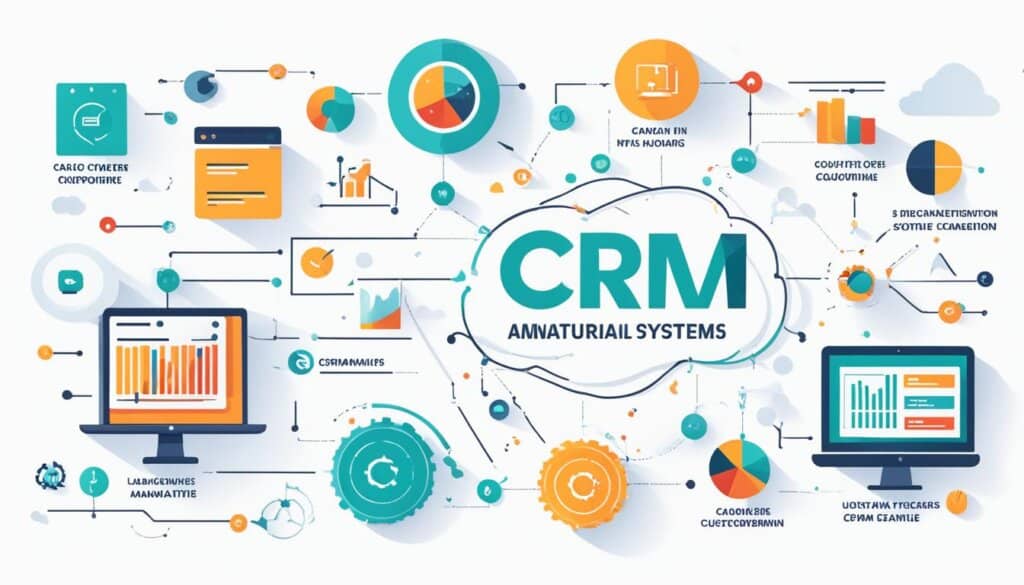Table of Contents
Customer relationship management (CRM) is a combination of practices, strategies, and technologies that companies use to manage and analyze customer interactions and data throughout the customer lifecycle. This includes compiling customer data from different channels and points of contact, such as the company’s website, telephone, live chat, direct mail, marketing materials, and social networks.
The goal of CRM is to improve customer service relationships, assist with customer retention, and drive sales growth. CRM systems also provide customer-facing staff with detailed data on customers’ personal information, purchase history, buying preferences, and concerns.
Implementing a CRM system is crucial for business success in today’s market. CRM systems help companies stay connected to customers, streamline processes, improve productivity, and drive growth. With a clear overview of customer data and interactions, businesses can better understand their customers, optimize marketing efforts, anticipate customer needs, and enhance customer satisfaction.
CRM also enables collaboration among different teams, improves communication, provides real-time data for informed decision-making, and helps businesses stay customer-centric. Additionally, CRM technology is the fastest-growing enterprise software category, with projected global spending reaching billions of dollars. Not adopting CRM can result in lost opportunities, poor customer service, and decreased profitability.
Benefits of CRM for Businesses
CRM systems offer a range of benefits for businesses of all sizes. These systems provide enhanced customer service through easily accessible customer information, empowering businesses to deliver personalized experiences and build strong relationships with their customers.
One of the key advantages of CRM systems is trend spotting through data collection and analysis. By consolidating customer data from multiple channels, such as website interactions, telephone calls, and social media engagements, businesses can gain valuable insights and identify patterns that can guide their marketing strategies and product development.
“CRM systems help businesses automate tasks, which streamlines their sales pipeline and customer support processes,” says Claire Davis, CEO of CRM Solutions Inc. “Automation reduces manual work, eliminates errors, and ensures a smooth and efficient workflow.”
CRM systems also provide robust marketing automation capabilities for lead generation. By automating repetitive marketing tasks, such as email campaigns and social media posting, businesses can generate and nurture leads at scale, saving time and resources.
Furthermore, CRM systems offer sales force automation tools that enable businesses to track customer interactions and build customer loyalty. Sales representatives can access comprehensive customer profiles, which include purchase history, preferences, and concerns, empowering them to provide personalized recommendations and exceptional service.
Contact center automation is another valuable feature of CRM systems. It reduces the tedious aspects of customer service, allowing customer service representatives to focus on resolving complex issues and providing a better experience. With all customer information readily available, representatives can respond to inquiries promptly and accurately.
“Geolocation technology is a game-changer in targeted marketing campaigns,” adds Davis. “With CRM systems, businesses can segment and target customers based on their location, increasing the effectiveness of their marketing efforts.”
Additionally, CRM systems help businesses optimize their processes through workflow automation. They can track sales leads more effectively, manage human resources efficiently, and conduct analytics for targeted marketing campaigns. Furthermore, integration with other software platforms and social media enables businesses to leverage their CRM system as a central hub for managing various aspects of their operations.
Overall, CRM systems provide businesses with the tools and functionalities to enhance customer service, automate processes, and drive growth. By leveraging these benefits, businesses can improve their competitive edge and achieve long-term success.
Key Benefits of CRM for Businesses
| Benefits | Description |
|---|---|
| Enhanced customer service | Easily accessible customer information empowers businesses to deliver personalized experiences and build strong customer relationships. |
| Trend spotting | Data collection and analysis help businesses identify patterns, enabling informed marketing strategies and product development. |
| Automation of tasks | Streamlines sales pipeline and customer support processes, reducing manual work and ensuring efficient workflows. |
| Marketing automation | Automates repetitive marketing tasks, such as email campaigns and social media posting, for lead generation and nurturing. |
| Sales force automation | Tracks customer interactions, builds customer loyalty, and enables personalized recommendations for sales representatives. |
| Contact center automation | Reduces tedious aspects of customer service, allowing representatives to focus on resolving complex issues. |
| Geolocation technology | Enables targeted marketing campaigns by segmenting and targeting customers based on their location. |
| Workflow automation | Optimizes business processes, including sales lead tracking, human resources management, and targeted marketing analytics. |
Components of CRM Systems
At its core, CRM software consolidates customer information into a single database, making it easily accessible and manageable. This centralization of data is the foundation of CRM systems and allows businesses to have a comprehensive view of their customers.
However, CRM systems have evolved over time to offer more than just data consolidation. Additional functions and capabilities have been added, enhancing the effectiveness and efficiency of CRM systems. Some of these components and capabilities include:
- Recording customer interactions over various channels: CRM systems enable businesses to capture and store customer interactions from different channels, such as emails, phone calls, social media interactions, and live chat conversations. This helps businesses maintain a complete record of customer interactions and gain valuable insights into customer preferences and behaviors.
- Automation of workflow processes: CRM systems streamline business processes by automating repetitive tasks and workflows. This automation improves efficiency, reduces errors, and allows employees to focus on more strategic and value-added activities.
- Geolocation technology: CRM systems leverage geolocation technology to identify the location of customers. This information enables businesses to target customers based on their geographical location and personalize marketing campaigns accordingly.
- Lead management: CRM systems provide tools for managing leads and tracking the progress of sales opportunities. Businesses can assign leads to specific sales representatives, track their interactions, and measure the effectiveness of sales efforts.
- Human resources management: Some CRM systems offer integrated HR management capabilities, enabling businesses to track employee information, performance, and training. This integration helps businesses align their workforce with customer needs and improve employee productivity.
- Analytics: CRM systems incorporate analytics tools to analyze the vast amount of customer data collected. These tools provide businesses with valuable insights into customer behavior, trends, and patterns, helping them make informed decisions and drive strategic initiatives.
- Artificial intelligence: AI-powered capabilities, such as machine learning and predictive analytics, are increasingly being integrated into CRM systems. These AI features enable businesses to automate and optimize various processes, personalize customer experiences, and make data-driven predictions.
- Project management: CRM systems often include project management functionalities, allowing businesses to manage and track projects related to sales, marketing campaigns, and customer service initiatives. This integration ensures that all customer-related projects are seamlessly integrated and executed.
- Integration with other software systems: CRM systems can be integrated with other software systems, such as marketing automation tools, email marketing platforms, customer service software, and accounting software. This integration enables businesses to have a unified view of customer data and ensures smooth information flow between different departments.
These components and capabilities come together to help businesses optimize their sales and marketing efforts, improve customer service, and track performance and productivity. With a comprehensive CRM system in place, businesses can effectively manage customer relationships and drive business success.

Types of CRM Technology
CRM technology is offered in different types to suit varying business needs. Businesses can choose from cloud-based CRM systems, on-premises CRM systems, and open source CRM systems, each with its own benefits and considerations.
Cloud-Based CRM Systems
Cloud-based CRM systems utilize cloud computing, providing businesses with easy access to data through an internet connection. This makes it convenient for companies with limited technological expertise or resources. With cloud-based CRM, businesses can store and access customer data from anywhere, anytime, as long as there is an internet connection available. This type of CRM system allows for scalability, flexibility, and cost savings, as there is no need for on-premises servers or infrastructure.
One of the key advantages of cloud-based CRM is its ability to offer real-time data updates and seamless integration with other cloud-based applications. Businesses can easily collaborate, share information, and manage customer relationships across different teams and locations. Additionally, cloud-based CRM systems often offer regular updates and maintenance by the CRM provider, ensuring that businesses always have access to the latest features and security patches.
On-Premises CRM Systems
On-premises CRM systems, as the name suggests, are installed on the company’s servers or infrastructure. This type of CRM system gives businesses more control over data storage and maintenance. Companies can customize and configure the CRM software to meet their specific needs and security requirements.
One of the advantages of on-premises CRM is the ability to have complete control over data privacy and security, as the data is stored on the company’s own servers. This can be particularly important for businesses operating in highly regulated industries or those with strict data protection policies.
On-premises CRM systems also offer the advantage of being able to integrate with existing legacy systems or databases that are already in use within the company. This allows for seamless data integration and a unified view of customer information across different departments or functions.
Open Source CRM Systems
Open source CRM systems make the source code of the software available to the public. This means that businesses have the freedom to modify, customize, and enhance the CRM software according to their specific requirements. Open source CRM systems offer flexibility and the ability to tailor the software to match the unique processes and workflows of a business.
Another advantage of open source CRM is the ease of integration with other software applications and social media channels. This enables businesses to enhance their customer engagement strategies and leverage social media platforms for marketing and customer relationship management.
However, it is important to note that open source CRM requires technical expertise or the involvement of developers to customize and maintain the software. Businesses need to allocate resources for ongoing development and support, which can increase the total cost of ownership compared to cloud-based or on-premises CRM systems.
Choosing the Right CRM Technology
The choice of CRM technology depends on a company’s specific business needs, resources, and goals. Cloud-based CRM systems are ideal for businesses with limited technological expertise or resources, providing easy access to data and scalability. On-premises CRM systems offer more control over data storage and customization options. Open source CRM systems provide flexibility and the ability to integrate with other software applications and social media channels. Businesses should evaluate their requirements, consider the costs and benefits of each type of CRM technology, and choose the one that best aligns with their business objectives.
CRM Examples in Practice
CRM can be applied in various ways depending on the specific system and purpose. Examples include:
- Contact center CRM: This involves data intake through sales, marketing, and contact center interactions. It allows businesses to capture valuable information about customers’ interactions with sales and support teams, enabling personalized and targeted communication.
- Social CRM: This focuses on engaging with customers through social media platforms and analyzing social media feedback. By monitoring and responding to customer conversations on social media, businesses can enhance their online presence, address customer concerns, and build stronger relationships.
- Sales CRM: This type of CRM system is specifically designed to streamline sales processes. It includes features such as lead management, opportunity tracking, and sales forecasting, enabling businesses to manage their sales pipeline effectively and close deals more efficiently.
- Marketing CRM: Marketing CRM systems help businesses automate marketing campaigns, track customer interactions, and segment customer data for targeted marketing efforts. This allows companies to deliver personalized messages, increase customer engagement, and improve the effectiveness of their marketing campaigns.
- Service CRM: Service CRM systems focus on managing customer support and service operations. They enable businesses to track customer inquiries, manage customer tickets, and provide timely and efficient support. Service CRM systems help streamline customer service processes and improve customer satisfaction.
- Collaborative CRM: This CRM system is designed to facilitate collaboration and information sharing among different teams within an organization. It allows employees from different departments, such as sales, marketing, and customer service, to access and update customer information, ensuring a unified approach to customer relationship management.
- Small Business CRM: Small businesses can benefit from CRM systems tailored to their specific needs. Small business CRM solutions provide essential features for managing customer relationships, such as customer contact management, lead tracking, and email integration. These systems help small businesses improve customer service, increase sales, and optimize business processes.
These examples showcase the versatility and effectiveness of CRM in managing customer relationships across different business functions. With the right CRM system in place, businesses can gain actionable insights, enhance customer interactions, and ultimately achieve their customer relationship management goals.
Importance of CRM for Business Success
Implementing a CRM system is crucial for business success in today’s market. CRM systems help companies stay connected to customers, streamline processes, improve productivity, and drive growth. With a clear overview of customer data and interactions, businesses can better understand their customers, optimize marketing efforts, anticipate customer needs, and enhance customer satisfaction.
CRM also enables collaboration among different teams, improves communication, provides real-time data for informed decision-making, and helps businesses stay customer-centric. By centralizing customer information, businesses can effectively coordinate sales, marketing, and customer service activities, resulting in more personalized and efficient interactions with customers.
Additionally, CRM technology is the fastest-growing enterprise software category, with projected global spending reaching billions of dollars. This reflects the increasing recognition of CRM’s value in helping businesses gain a competitive edge. Not adopting CRM can result in lost opportunities, poor customer service, and decreased profitability. Businesses who do not leverage CRM may struggle to stay relevant and meet customer expectations in an increasingly digital and data-driven business landscape.
FAQ
What is customer relationship management (CRM)?
Customer relationship management (CRM) is a combination of practices, strategies, and technologies that companies use to manage and analyze customer interactions and data throughout the customer lifecycle. This includes compiling customer data from different channels and points of contact, such as the company’s website, telephone, live chat, direct mail, marketing materials, and social networks. The goal of CRM is to improve customer service relationships, assist with customer retention, and drive sales growth. CRM systems also provide customer-facing staff with detailed data on customers’ personal information, purchase history, buying preferences, and concerns.
What are the benefits of CRM for businesses?
CRM systems offer a range of benefits for businesses of all sizes. These include enhanced customer service through easily accessible customer information, trend spotting through data collection and analysis, and automation of tasks to streamline sales pipeline and customer support processes. CRM systems also provide marketing automation capabilities for lead generation, sales force automation tools for tracking customer interactions and building customer loyalty, contact center automation to reduce tedious aspects of customer service, and geolocation technology for targeted marketing campaigns. Additionally, CRM systems help optimize business processes through workflow automation, track sales leads, manage human resources, conduct analytics for targeted marketing campaigns, and integrate with other software and social media platforms.
What are the components of CRM systems?
At its core, CRM software consolidates customer information into a single database, making it easily accessible and manageable. Additional functions and capabilities have been added to CRM systems over time, including recording customer interactions over various channels, automation of workflow processes, geolocation technology, lead management, human resources management, analytics, artificial intelligence, project management, and integration with other software systems. These components and capabilities help businesses optimize sales and marketing efforts, improve customer service, and track performance and productivity.
What are the types of CRM technology available?
CRM technology is offered in different types to suit varying business needs. Cloud-based CRM systems use cloud computing and offer easy access to data through an internet connection, making it convenient for businesses with limited technological expertise or resources. On-premises CRM systems are installed on the company’s servers, giving the company more control over data storage and maintenance. Open source CRM systems make source code available to the public, allowing for customization and integration with social media channels. Each type of CRM technology has its own costs and benefits, and the choice depends on a company’s business needs, resources, and goals.
How can CRM be applied in practice?
CRM can be applied in various ways depending on the specific system and purpose. Examples include contact center CRM, which involves data intake through sales, marketing, and contact center interactions, and social CRM, which focuses on engaging with customers through social media platforms and analyzing social media feedback. CRM systems can also be used for sales, marketing, service CRM, collaborative CRM, and small business CRM. These examples showcase the versatility and effectiveness of CRM in managing customer relationships across different business functions.
Why is CRM important for business success?
Implementing a CRM system is crucial for business success in today’s market. CRM systems help companies stay connected to customers, streamline processes, improve productivity, and drive growth. With a clear overview of customer data and interactions, businesses can better understand their customers, optimize marketing efforts, anticipate customer needs, and enhance customer satisfaction. CRM also enables collaboration among different teams, improves communication, provides real-time data for informed decision-making, and helps businesses stay customer-centric. Additionally, CRM technology is the fastest-growing enterprise software category, with projected global spending reaching billions of dollars. Not adopting CRM can result in lost opportunities, poor customer service, and decreased profitability.












